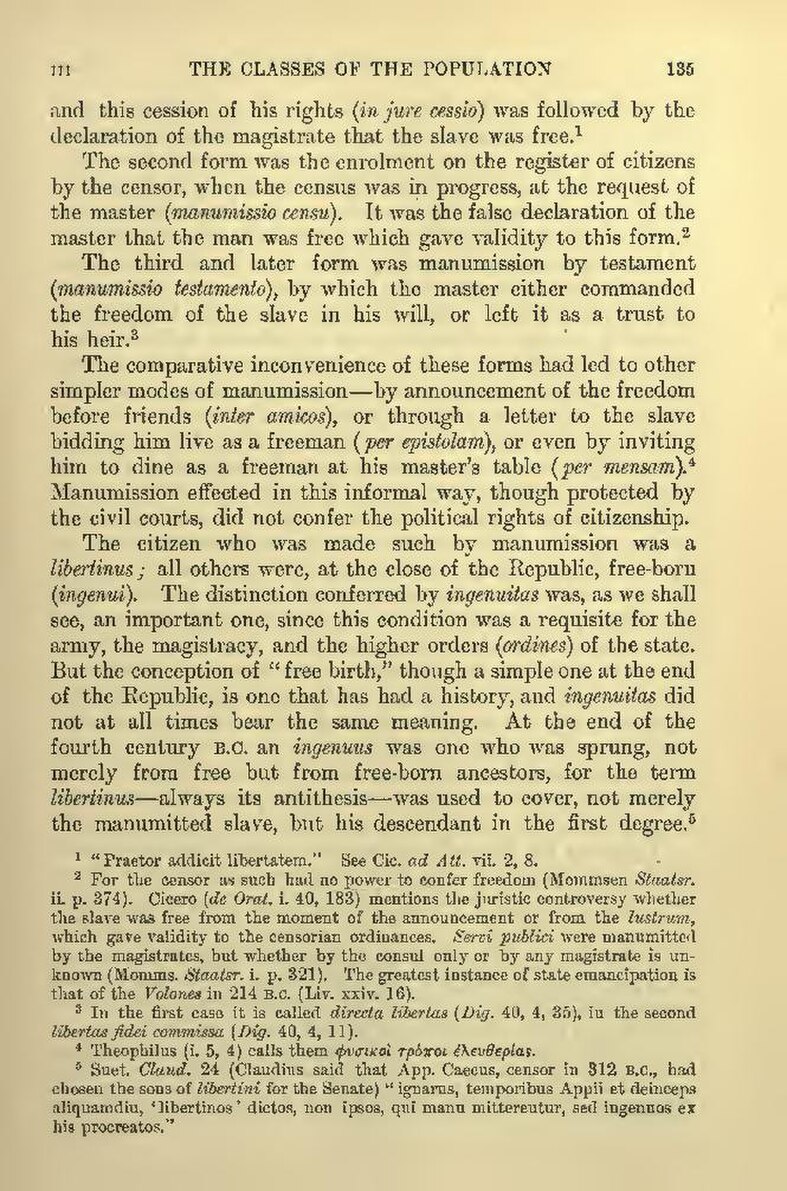and this cession of his rights (in jure cessio) was followed by the declaration of the magistrate that the slave was free.[1]
The second form was the enrolment on the register of citizens by the censor, when the census was in progress, at the request of the master (manumissio censu). It was the false declaration of the master that the man was free which gave validity to this form.[2]
The third and later form was manumission by testament (manumissio testamento), by which the master either commanded the freedom of the slave in his will, or left it as a trust to his heir.[3]
The comparative inconvenience of these forms had led to other simpler modes of manumission—by announcement of the freedom before friends (inter amicos), or through a letter to the slave bidding him live as a freeman (per epistolam), or even by inviting him to dine as a freeman at his master's table (per mensam).[4] Manumission effected in this informal way, though protected by the civil courts, did not confer the political rights of citizenship.
The citizen who was made such by manumission was a libertinus; all others were, at the close of the Republic, free-born (ingenui). The distinction conferred by ingenuitas was, as we shall see, an important one, since this condition was a requisite for the army, the magistracy, and the higher orders (ordines) of the state. But the conception of "free birth," though a simple one at the end of the Republic, is one that has had a history, and ingenuitas did not at all times bear the same meaning. At the end of the fourth century B.C. an ingenuus was one who was sprung, not merely from free but from free-born ancestors, for the term libertinus—always its antithesis—was used to cover, not merely the manumitted slave, but his descendant in the first degree.[5].]
- ↑ "Praetor addicit libertatem." See Cic. ad Att. vii. 2, 8.
- ↑ For the censor as such had no power to confer freedom (Mommsen Staatsr. ii. p. 374). Cicero (de Orat. i. 40, 183) mentions the juristic controversy whether the slave was free from the moment of the announcement or from the lustrum, which gave validity to the censorian ordinances. Servi publici were manumitted by the magistrates, but whether by the consul only or by any magistrate is unknown (Momms. Staatsr. i. p. 321). The greatest instance of state emancipation is that of the Volones in 214 B.C. (Liv. xxiv. 16).
- ↑ In the first case it is called directa libertas (Dig. 40, 4, 35), in the second libertas fidei commissa (Dig. 40, 4, 11).
- ↑ Theophilus (i. 5, 4) calls them [Greek: physikoi tropoi eleutherias
- ↑ Suet. Claud. 24 (Claudius said that App. Caecus, censor in 312 B.C., had chosen the sons of libertini for the Senate) "ignarus, temporibus Appii et deinceps aliquamdiu, 'libertinos' dictos, non ipsos, qui manu mitterentur, sed ingenuos ex his procreatos."
